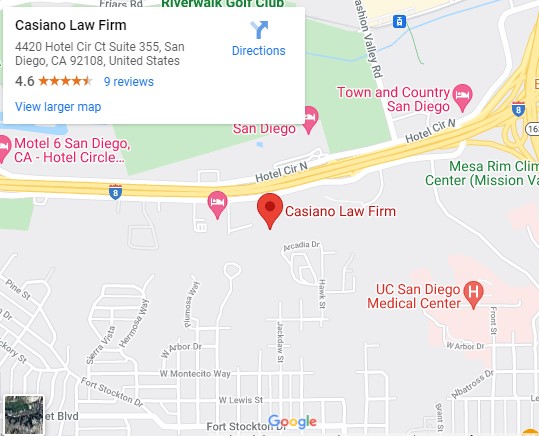Probate Attorney in San Diego, California
The government requires a method to manage the financial implications of someone’s death, ensuring that debts are paid and collected, survivors are supported, and the deceased’s property is dispersed according to their wishes.
This legal procedure is known as probate, and it is used in every state, including California, to keep things running smoothly following a death.
Contact experienced probate and estate planning attorney Vincent Casiano in San Diego, California for a free legal consultation!
Wills and trusts are the most common ways for property to be distributed in probate. If the person did not leave a will, the state enforces a distribution scheme based on the state’s intestacy rules.
The court oversees the procedure, but it is usually carried out by the deceased’s representative, which can be either of the following:
- the executor named by the deceased in the will, or
- the administrator designated by the court to fulfill the same job.
What is Probate?
Probate is the official legal procedure through which a will is recognized. The executor or personal representative is appointed to administer the estate and transfer assets to the specified recipients.
It is a process done under the court’s supervision that includes:
- Authenticating a will
- Paying off debts
- Transferring assets to beneficiaries
Probate Without a Will
If a person dies without a will, they are said to have died “intestate.” In that case, the court will distribute the decedent’s assets according to state intestacy laws.
Probate With a Will
If the person left a will, the court must first assess whether or not it is legitimate and authentic. The court then chooses a representative to handle the estate, usually specified as a personal representative in the will.
(619) 800-6820
What is the Probate Process in California?
In the interview with Ask the Lawyers, Vinny covered the probate process in California. He also outlined the time restriction, other conditions, and when to go through the formal process.
(619) 800-6820
How Does Probate Work?
There are several steps to the legal probate process:
File the Death Certificate
To begin the probate procedure, an executor or representative of the estate will file the death certificate and the will with the probate court. If there is no will, the decedent is considered to have died intestate. The procedure is expedited if there is a will.
Validate the Will
If there is a will, the court authenticates it to ensure that it is the testator’s genuine, intended will. They also ensure the will has the proper witnesses and is duly notarized, as state laws require.
You can speed up this process if your will has a “self-proving” affidavit. This affidavit, signed in front of a notary by the witnesses, certifies that the will is genuine. It eliminates the need for witnesses to testify in court about the will’s legitimacy.
Appoint a Personal Representative
The estate must now be administered by someone nominated in the will as a personal representative. However, the judge must appoint the personal representative as the executor or personal representative before they can be officially authorized to act on behalf of the estate. If there is no will, the judge will designate someone, generally a family member, to manage the estate.
The personal representative will obtain a “Letter of Testamentary,” an authorization letter from the probate court to administer the decedent’s estate.
Post a Bond
The court may compel a personal representative to post a probate bond to guarantee that the executor will abide by state laws and the terms of the deceased. The estate pays for the bond. However, you can waive the bond requirement for your representative in your will. It will save your estate money in the long run.
Alert Creditors and Beneficiaries
The personal representative is now responsible for selecting beneficiaries and alerting creditors of the probate proceedings. After that, creditors have a certain amount of time to file claims against the estate. They will not collect on such claims if they do not respond within that time frame.
Appraise Property and Assets to Determine the Value of Your Estate
The personal representative must also determine the value of all probate assets. It may entail obtaining real estate appraisals, compiling a personal property inventory, and determining the value of assets. The personal representative may hire appraisers to determine property values.
Pay Valid Debts
Funeral expenses, terminal illness-related expenses, and taxes are frequently the first debts paid from your inheritance. The personal representative subsequently pays any genuine creditor claims. The personal representative can contest or settle creditor claims on behalf of the estate.
Distribute Assets to Beneficiaries
After settling estate obligations, taxes, and claims, the personal representative distributes the remaining assets to the beneficiaries listed in your will. Your assets will be distributed according to state intestacy laws if you die without a will.
Close the Estate
The personal representative files a final accounting with the court to close the estate. The final accounting lists all the estate’s assets and the revenue earned from those assets. All debts paid and disbursements given to beneficiaries or heirs are also included in the report.
When the court approves this report, the personal representative is relieved of their probate obligations, and the probate estate is legally closed.
(619) 800-6820
Purpose and Importance of Probate
Six of the most significant purposes of probate were discussed in the video. Casiano Law ensures you are aware of the advantages you will receive during the legal procedure of probate, from fraud protection to ownership.
What Goes Through Probate?
Only properties and assets under your name are included in your estate.
For example, if you had a property that was solely titled in your name, the value of that property is included in your estate. As such, it’s helpful to know what property goes through probate.
Many assets, such as a bank account with a “transfer-on-death” (TOD) designation, transfer outside of probate. If you specify a transfer-on-death beneficiary, the bank account will be transferred to them after your death. As a result, it is not subject to probate. Likewise, life insurance benefits go directly to your specified beneficiaries and are not included in your inheritance.
As a general rule, the following types of property and assets do not go through probate:
- Bank and investment accounts with transfer-on-death beneficiaries
- IRA and retirement accounts with transfer-on-death beneficiaries
- Real estate owned in joint tenancy
- Life insurance policies with named beneficiaries
- Lifetime gifts and distributions
- Any property held in a trust
Examples of property or other assets that do go through probate are:
- Any bank or financial account, stock, or retirement account in your name only
- Real property titled in your name only
- Cars, boats, or RVs titled in your name only
Keep in mind that if you don’t identify a beneficiary on any accounts, they’ll end up in your probate estate. On the other hand, if a beneficiary you designate on an account passes away before you, such an account may not have an owner, and it will become part of your probate estate.
A probate court, once again, deals with property that does not have an identified owner. If you prepare beforehand, your probate estate may be significantly reduced.
(619) 800-6820
What is the Best Approach to Keeping Assets Out of Probate?
In his discussion with Ask the Lawyers, Vinny addresses the best approach to avoid probate and how a California probate lawyer can assist you in doing so.
How Can I Avoid Probate?
The best way to avoid probate is to not own any probate property in the first place. Your estate will be eligible for your state’s expedited probate process. You can avoid a lengthy and costly probate process by filing affidavits with the probate court.
Four Ways to Avoid Probate
- Title Your Real Property With a Joint Owner
Owning a property with another owner, if adequately named, may keep your stake in the property out of your probate estate. The property’s ownership immediately passes to the surviving owner when you pass away. Those ownership types are
- Joint Tenancy With Right of Survivorship. All of the owners own this property. When one of the owners passes away, the property is divided among the remaining owners.
- Tenancy by the Entirety. This is a type of property ownership solely between married couples. Both have 100% ownership. If one of the spouses dies, the property is immediately given to the surviving spouse.
- Community Property. All property acquired or created by one person during the marriage belongs to both spouses. When a spouse dies, the entire property transfers to the surviving spouse. California is a community property state.
- Establish a Revocable or Living Trust
A revocable or living trust is a legal arrangement that allows you to transfer your property and assets to others without going through probate. The trust becomes the property owner when you title it in the trust’s name. Even if you can utilize the property for your profit, it is no longer considered part of your estate.You can instruct your trustee to make an outright distribution of your assets to your beneficiaries after your death. Alternatively, the trustee may hold the assets until your beneficiaries reach adulthood. You can move property in and out of a revocable trust throughout your lifetime or revoke it entirely.
Not sure which type of trust best fits your need? Talk to San Diego estate litigation & estate planning attorney, Vincent Casiano, to determine the best estate planning tool for you and your family.
- Name Beneficiaries
Make sure that all of your bank, retirement, and investment accounts, as well as life insurance policies, have beneficiaries named. In addition, make a list of backup beneficiaries if your primary beneficiary passes away. - Give Away Property During Your Lifetime
The less individual property you own, the less probate property you have. To minimize your estate, you may give gifts to family and friends or donate to charitable institutions.
(619) 800-6820
How Can I Speed Up the Probate Process?
If you can’t avoid probate entirely, you can reduce the length of the probate process significantly by taking these three steps:
Make a Will
To begin, make sure you have a legal will completed. Having named beneficiaries for your property means that the court does not need to go through intestate succession regulations to determine who will inherit your property.
Use a “Self-Proving” Affidavit
Second, utilize a “self-proving” affidavit if your state allows it, so the will is already validated. The court is not required to contact the witnesses to testify on the will’s validity.
Reduce Your Probate Estate
Third, use the methods outlined above to lower the amount of your probate estate. The smaller your estate, the more likely you avoid a lengthy probate process. For modest estates, most jurisdictions provide simplified estate administration.
In California, for example, if your estate was worth less than $166,250 in 2020, you may avoid formal probate. The personal representative instead files affidavits to the court.
(619) 800-6820
Attorney Vincent Casiano Can Help You!
Although the probate process may appear complicated, most states provide paperwork to assist in the process. Having a qualified San Diego probate attorney on your side may also help to put your mind at ease so you can go through the procedure as quickly as possible.
Attorney Vincent Casiano can also help you with Elder Law and other Estate Planning concerns, including Medi-Cal planning, long-term care planning, trust administration, and more.
(619) 800-6820

